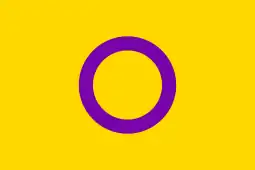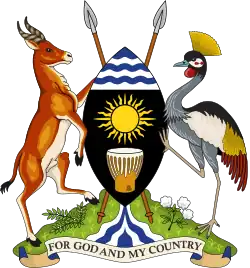| Intersex rights in Uganda | |
|---|---|
.svg.png.webp) | |
| Protection of physical integrity and bodily autonomy | No |
| Protection from discrimination | No |
| Changing M/F sex classifications | Yes (children only) |
| Intersex topics |
|---|
 |
Intersex people in Uganda face a dangerous environment, with significant gaps in protection from mutilation and non-consensual cosmetic medical interventions and protection from discrimination.
History
Traditionally, children who are identified as having an intersex condition at birth were killed, and mothers may be accused of witchcraft.[1] This is beginning to change, with the help of intersex civil society organizations like SIPD Uganda, but stigma, violence, abuse and exploitation still persist.[1][2]
In December 2017, African intersex activists published a statement setting out local demands.[3]
Physical integrity and bodily autonomy

Reports suggest that the birth of an intersex infant can be regarded as a curse or bad omen, resulting in infanticide, neglect, and the stigmatization of the mother.[2] Mothers may even be expelled from their community, and intersex children may be separated from siblings.[1][4]
Intersex persons may experience coercive medical interventions, in medical settings and outside medical settings. However, intersex persons who require medical attention may also have difficulties accessing necessary treatment.[1][5]
A 2014 Civil Society Coalition on Human Rights and Constitutional Law report identified multiple cases where surgeries and medical interventions led to human rights abuses. In one case, surgery conducted by medical practitioners without family consent led to the child having health problems and dropping out of school.[4] In another case, a child was abandoned at hospital after genital surgery because of the cost of treatment. The hospital discontinued his treatment.[4]
Sam Lyomoki, a Ugandan MP and a doctor, has stated that the parliament "issued guidelines in 2015 to the Ministry of Health advising against surgical intervention for intersex infants", however, "Local radio stations in Uganda buzz with appeals seeking donors to help fund genital reshaping surgery abroad" and surgeries are also carried out within Uganda.[6] Local organization SIPD Uganda "advocates for the 'best guess' non-surgical approach where an intersex child should be raised in the best-suited gender, without irreversible surgical intervention, until they can be active participants in the decision".[6]
Protection from discrimination

The constitution of Uganda provides for recognition of fundamental rights and freedoms, equality and non-discrimination, privacy, education and affirmative action.[1] The African Charter on the rights and welfare of the African child commits member countries, including Uganda, to the protection of all children – including intersex children – against social, economic, cultural and political abuse and exploitation.[1] In practice, intersex persons remain subject to violence, discrimination and abuse.[7]
In research by SIPD Uganda, 90% of intersex youth reported that they were forced to drop out of school because of the immense stigma and discrimination associated with the non-binary development of their intersex body."[1][8]
Identification documents
The Registration of Persons Act 2015 allows for the registration of a child born a "hermaphrodite", and for change of name and change of sex classification. The recommendation of a medical clinician is required. Changes of name can create social problems, and the situation of adults is uncertain.[9][1] Many intersex persons are understood to be stateless due to historical difficulties in obtaining identification documents.[1]
Rights advocacy
SIPD Uganda has called for recognition of the human rights of intersex people in Uganda, and in the East African region, including protection from harmful surgeries, access to care, protection from discrimination and abuse, and access to education and employment. SIPD Uganda has worked with some 700 intersex persons in the 25 Ugandan administrative districts where it delivers services.[5] The organization also convened a 2014 regional meeting of intersex advocates allies from Rwanda, Burundi, Kenya, Congo, Tanzania, and Uganda.[1]
Intersex is commonly confused with being lesbian or gay, and this has consequences for organizing and disclosure, as well as discrimination towards intersex persons. Julius Kaggwa, the executive director of SIPD, describes the situation in Uganda as dangerous.[7][10][11][12]
See also
References
- 1 2 3 4 5 6 7 8 9 10 Support Initiative for Persons with Congenital Disorders (2016), Baseline Survey on Intersex Realities in East Africa - Specific Focus on Uganda, Kenya and Rwanda
- 1 2 Kaggwa, Julius (October 2016). "Understanding intersex stigma in Uganda". Intersex Day. Archived from the original on 2017-04-08. Retrieved 2017-05-13.
- ↑ African Intersex Movement (December 2017), Public Statement by the African Intersex Movement, retrieved 2018-09-05
- 1 2 3 Civil Society Coalition on Human Rights and Constitutional Law; Human Rights Awareness and Promotion Forum; Rainbow Health Foundation; Sexual Minorities Uganda; Support Initiative for Persons with Congenital Disorders (2014). "Uganda Report of Violations based on Sex Determination, Gender Identity, and Sexual Orientation". Archived from the original on 2015-05-03. Retrieved 2017-05-14.
- 1 2 Richter, Ruthann (March 4, 2014). "In Uganda, offering support for those born with indeterminate sex". Stanford Medicine. Archived from the original on July 30, 2015.
- 1 2 Kakande, Yasin (December 18, 2016). "In Uganda, parents seek controversial genital surgery for 'intersex' babies". Thomson Reuters Foundation News. Archived from the original on December 21, 2016. Retrieved 2017-05-15.
- 1 2 Kaggwa, Julius (September 16, 2016). "I'm an intersex Ugandan – life has never felt more dangerous". The Guardian. ISSN 0261-3077. Archived from the original on March 9, 2017. Retrieved 2017-05-13.
- ↑ "Growing up intersex in Uganda". International Planned Parenthood Federation. Archived from the original on 2017-06-14. Retrieved 2017-05-15.
- ↑ Parliament of Uganda (2015), Registration of Persons Act, archived from the original on 2017-05-01
- ↑ Kaggwa, Julius (August 24, 2012). "Life's No Play, But Certain Characters' Voices Are Heard Loud and Clear in Uganda". The Huffington Post. The World Post. Archived from the original on September 24, 2015. Retrieved 2015-07-20.
- ↑ Kaggwa, Julius (April 18, 2010). "Ugandan Anti-Homosexuality Bill Doubly Endangers LGBT Community and Human Rights Activists". The Huffington Post. The World Post. Archived from the original on September 24, 2015. Retrieved 2015-07-20.
- ↑ "Becoming Julius: Growing up intersex in Uganda". BBC News. February 26, 2017. Archived from the original on May 24, 2017. Retrieved 2017-05-15.
Bibliography
- Support Initiative for Persons with Congenital Disorders (2016). "Baseline Survey on Intersex Realities in East Africa - Specific Focus on Uganda, Kenya and Rwanda" (PDF). Archived from the original (PDF) on 2017-09-26. Retrieved 2017-05-14.
- Civil Society Coalition on Human Rights and Constitutional Law; Human Rights Awareness and Promotion Forum; Rainbow Health Foundation; Sexual Minorities Uganda; Support Initiative for Persons with Congenital Disorders (2014). "Uganda Report of Violations based on Sex Determination, Gender Identity, and Sexual Orientation". Archived from the original on 2015-05-03. Retrieved 2017-05-14.
- Kakande, Yasin (December 18, 2016). "In Uganda, parents seek controversial genital surgery for 'intersex' babies". Thomson Reuters Foundation News. Retrieved 2017-05-15.
- "Becoming Julius: Growing up intersex in Uganda". BBC News. February 26, 2017. Retrieved 2017-05-15.
